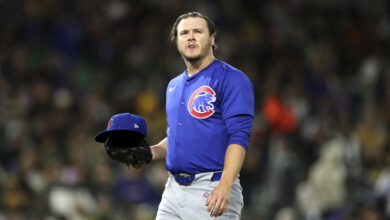
What’s Up with Jason Hammel’s Market and Could a Cubs Reunion Happen?
Hey, remember how the Cubs did Jason Hammel a solid by releasing him so he could hit the open market and score a bigger deal in a really weak starting pitching market? Yeah, about that. There’s still plenty of Winter left, but what was predicted to be a contract in the neighborhood of three years and $42 million has yet to materialize. In fact, there’s been virtually nothing at all when it comes to chatter involving the veteran righty.
A quick search on MLB Trade Rumors, generally on the forefront of even the most incidental and seemingly insignificant news and notes, yields nothing newer than a December 20 post regarding Hammel changing agents. Prior to that? A piece from November 7 about the Cubs declining his option. Not that Hammel’s courtship was going to make a lot of noise, but so far it’s been as quiet as [insert Cubs-friendly location at which you watched Game 7] when Rajai Davis hit that game-tying home run.
To what can we attribute this silence? The agency switch has something to do with it, whether it’s because Hammel wanted to avoid negotiating until after he’d secured new representation or because the old outfit had piss-poor aim when trying to shoot fish in a barrel. I think that’s more of an ancillary issue, though, merely a symptom of a greater issue. Or issues.
First up is the elbow tightness that hampered Hammel late in the season and may have been a contributing factor in the decision to leave him off the rosters for each playoff series. For what it’s worth, I think him being right-handed and the Cubs needing only four starters factored more heavily. The 2015 season saw a hamstring injury derail Hammel’s second half, and leg issues threatened again this season before a unique cure was found.
Perhaps even more off-putting than the idea of a minor injury here or there is the fact that a multi-year contract would, by definition, include multiple second halves. Last season’s 69-point jump in OPS allowed (.699 to .768) after the All-Star break is actually 16 points better than Hammel’s career-average disparity (.720 to .805) and (.612 to .856) and 175 points better than that disastrous 2015 campaign. We could look into other stats too, I guess, but that would just belabor the point. What I’m getting at is that consistency isn’t necessarily Hammel’s calling card.
Then you’ve got the whole Tyson Ross thing, which involves somewhere from six to eight teams (the Cubs among them) and could be constipating movement on a Hammel deal. If no other teams are willing to push their potato chips in on a guy with a junk food habit and a tendency to fade down the stretch (and I have no doubt at least one of them eventually will be), could the Cubs bring him back on a Dexter Fowler-style cushion deal?
For more on that, we turn to special correspondent, Kevin Garnett:
Far be it for me to take umbrage with KG, but I’d put the gulf between possible and probable at too far for even the ruby-throated hummingbird to traverse. While picking up another starting pitcher on a well-below-market-value deal would make all the sense in the world for the Cubs, Jason Hammel just isn’t going to be that guy.
I don’t doubt for a second the veracity of the story that Theo Epstein had a handshake agreement with Hammel to not flip him in another trade. Thing is, that dish only holds so much water. The Cubs still could have exercised the option and kept their rotation intact for significantly less than the going rate for a mediocre starter. Is loyalty really worth more than taking out an insurance policy on the team’s success? Only if the Cubs couldn’t guarantee a spot for Hammel or, more accurately, felt they were better without him.
That might sound harsh, but you can’t tell me the team gave the dude up for literally nothing just because they wanted the warm fuzzies from seeing him sign a bigger contract than they could offer him. No, the Cubs simply didn’t see Hammel as a part of the future, which is why they were content to let him get his. And that’s exactly why he won’t be coming back.
In Fowler’s case, last year anyway, we saw a guy who the Cubs very obviously wanted but who was expected to command a lengthier, more lucrative deal elsewhere. Fowler’s market drying up turned out to be nothing short of a huge stroke of luck for his old team and his return worked out perfectly for both sides. Hammel, who will turn 35 in September, can’t really take a gamble on a one-year deal and surely wouldn’t want to absent a guaranteed starting role if he did.
Okay, just bump Mike Montgomery back to the pen. While I’m very much in favor of that concept in a vacuum, it doesn’t make any sense when exposed to the open air. I mean, if they’d have wanted to do that, the Cubs would have exercised Hammel’s option and you wouldn’t have slogged through the last 800 words or so. You can keep speculating or postulating or dreaming or whatever about a reunion, I just can’t imagine a scenario in which it actually happens.


